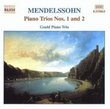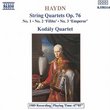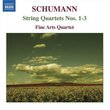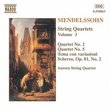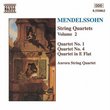| All Artists: Felix Mendelssohn, Aurora String Quartet Title: Mendelssohn: String Quartet Vol.1 Members Wishing: 0 Total Copies: 0 Label: Naxos Original Release Date: 1/1/1994 Re-Release Date: 10/4/1994 Genre: Classical Style: Chamber Music Number of Discs: 1 SwapaCD Credits: 1 UPC: 730099586122 |
Search - Felix Mendelssohn, Aurora String Quartet :: Mendelssohn: String Quartet Vol.1
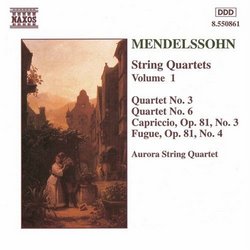 | Felix Mendelssohn, Aurora String Quartet Mendelssohn: String Quartet Vol.1 Genre: Classical
|
Larger Image |
CD DetailsSimilar CDs |
CD ReviewsVaried, Top-Notch Mendelssohn 09/26/2001 (5 out of 5 stars) "There are many strengths to celebrate in this recording. First, the music. The two quartets represent Mendelssohn at his finest, yet they explore the antipodes of his emotional spectrum. The Quartet No. 6, a late work written soon after the death of the composer's beloved sister Fanny, is unlike almost any Mendelssohn that had come before. Whereas Mendelssohn seemed addicted to the minor key throughout his carer, most of the drama in his minor-key works seems canned, especially when compared to the passion and torment of Beethoven's or Schumann's minor-key excursions. But in the Quartet No. 6, the passion is real. The first movement is a whirlwind of restless energy, lacking any comfort. None is offered in the second movement, not a typical Mendelssohn scherzo but a sort of witches' dance, bleak and macabre in feeling. Respite of a sort comes in the elegiac slow movement, achingly nostalgic as it is. None of the mawdlin sentiments Mendelssohn is guilty of in some of his earlier slow music: This is clearly a deeply felt lament for Fanny. The last movement is again restless, almost demonic, in the manner of the last movement of Schubert's Death and the Maiden Quartet.Then comes the Quartet No. 3, perhaps my favorite Mendelssohn quartet, a sunny and expansive work in the manner of the composer's Italian Symphony. The first movement starts very much like that symphony's first movement, with a bright theme stated over tremolos in the lower strings. A tender second theme is finally dominated by the buoyant first theme, which propels the movement to one of the most memorable of Mendelssohn's codas. As in the Italian Symphony, the first movement is a hard act to follow, but the delicate minuet second movement and andante provide a lovely melodiousness before the whirlwind finale concludes the quartet in a spritely fashion.The Capriccio and Fugue are sizable chunks from the workman's bench and are both welcome as well, especially with the loving care the Aurora String Quartet lavishes on them.In fact, the Aurora is just about perfect in this music. The integration of the quartet is a wonder, but the solo playing of the members, especially the first violin (Sharon Grebanier), are equally remarkable. I haven't enjoyed the Third Quartet so much since the virtuoso performance I heard the golden-era Julliard give on an old Epic recording (that goes back a way!).The recording, made in a resonant hall that does not in any way compromise the lifelike presence of the quartet, is very fine as well. In short, this is all around top-notch Mendelssohn. At Naxos' price, it's can't-go-wrong Mendelssohn." Fantastic recording of one of the greatest quartests written Isaac Epp | San Francisco, CA USA | 01/09/2007 (5 out of 5 stars) "I should first confess that I have a pretty large soft spot for dark and complex chamber music so this is something I was naturally drawn to. With that out of the way, I consider Mendelssohn's string quartet #6 in F minor to be one of the finest chamber pieces ever composed, and the Aurora quartet's recording of it is my preferred version. I could listen to the quartet in F minor and the capriccio in E minor on repeat for days... and admittedly have done so on multiple occasions." Excellent version jt52 | New Jersey | 02/02/2005 (5 out of 5 stars) "I have Vols 1 & 2 of the Aurora Quartet Naxos set and recommend them highly. The playing is expressive and technically this California ensemble is top notch. I often have problems with the quality of the Naxos label recordings. I'm happy to say this is not a problem with this set of recordings. By way of comparison, I have the Ysaye Quartet recording of Opp 12, 13 and 80 as well. The Ysaye are good and often exciting but sometimes astringent. Let's let my actions do the talking: I listen to the Aurora set almost exclusively now."
|

 Track Listings (10) - Disc #1
Track Listings (10) - Disc #1